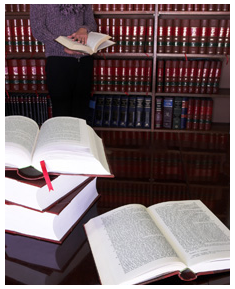Archival Notice
This is an archive page that is no longer being updated. It may contain outdated information and links may no longer function as originally intended.
Home | Glossary | Resources | Help | Contact Us | Course Map
The failure to prepare adequately for courtroom testimony can lead to disaster. Pretrial preparation begins upon receipt of the case. Ensuring that complete, accurate, and legible case file notes are documented will dramatically reduce the amount of pretrial preparation required and, most likely, the amount of time that the witness will remain on the stand.
Prior to giving any testimony the analyst should thoroughly review the entire case file along with any source or reference material contained in the case. The analyst should be prepared to answer questions about their laboratory standard operating procedure, proficiency testing, accreditation, and literature in the field that directly relates to the testing performed in the instant case.
Given the large body of literature in the DNA field, it would be impractical to know of every article, study, or text that deals with DNA. When confronted with an unfamiliar piece of scientific literature, one possible and not unreasonable response could be "I am not certain about the piece that you are referring to. However, if you have a copy, I would be happy to take a look at it." Special note should be made that the response did nothing more than offer to look at the piece. It did not indicate that you could adequately digest and apply the substance to any further questions.
Additionally, the analyst should schedule a time to meet with the attorney and review the case file and test results. Do not expect the attorney to be fully versed in your field of expertise or know what questions he or she should ask. Likewise, you should assist the attorney in the preparation of any exhibits or demonstrative aides that you expect to use. This entails creating graphical presentations, ensuring the content is accurate. If using electronic methods such as Power Point, slides, videos, jpg, etc., you should practice and be prepared to use the media during trial. Witnesses must also be prepared for the worst case scenario during trial. For example, the witness should always have a back-up method ready for use in the event of an unexpected technical problem.
See the YouTube Terms of Service and Google Privacy Policy
Additional Online Courses
- What Every First Responding Officer Should Know About DNA Evidence
- Collecting DNA Evidence at Property Crime Scenes
- DNA – A Prosecutor’s Practice Notebook
- Crime Scene and DNA Basics
- Laboratory Safety Programs
- DNA Amplification
- Population Genetics and Statistics
- Non-STR DNA Markers: SNPs, Y-STRs, LCN and mtDNA
- Firearms Examiner Training
- Forensic DNA Education for Law Enforcement Decisionmakers
- What Every Investigator and Evidence Technician Should Know About DNA Evidence
- Principles of Forensic DNA for Officers of the Court
- Law 101: Legal Guide for the Forensic Expert
- Laboratory Orientation and Testing of Body Fluids and Tissues
- DNA Extraction and Quantitation
- STR Data Analysis and Interpretation
- Communication Skills, Report Writing, and Courtroom Testimony
- Español for Law Enforcement
- Amplified DNA Product Separation for Forensic Analysts


